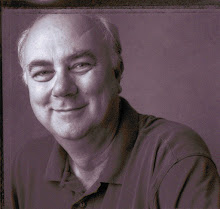I wrote this column in 1993 for the New York Daily News.
Father and son, 1952. For some reason, lost in the mists of time, son is not happy.
Fathers Are Also Sons
I bought a video camera the year my son
Will was born. And proceeded to videotape the first year of his life one-to-one
(a minute of tape for every waking minute). I captured everything: crawling,
walking, jabbering, talking, everything except the seminal moments, like his
first word (the battery was charging), his first step (the tape ran out) and
his first home run (he didn't hit one).
We have a whole wall of Will's First Year
videotapes and someday we may watch them.
But I forgot one thing in my haste to
videotape everything in my son's life: I forgot that fathers are also sons. I
never videotaped my own father. There is one tape I took at a family reunion:
Will is running around, playing with his cousins and in the background you can
hear my father talking to Will. Will wanders over toward his Grandpa but Vince
the cameraman never got Grandpa in the frame. He is Off-Screen Voice. In other
tapes he is next to someone, behind someone. He walks out of the picture, across
the picture, away from the picture.
My father is a bit player in all my home
videos.
And it is on Father's Day that I regret
that most.
My father died in 1986. I had owned a
video camera for four years by then. And I had never taken advantage of modern
technology to preserve a record of my father, the way he laughed, the way he
talked, the stories he told me and the ones he wouldn't tell me.
During World War II my father served in
the Pacific under General MacArthur ("way under," he said). He was
always reluctant to talk about his war experiences. He told me once about the
morning he woke up to find a dud bomb lying in the muck outside his tent. But
that was one of the few stories he told. I tried once to get him to watch
"The World at War" with me, to
add a personal perspective to the World War II documentary, but he refused.
"I lived it," he said. "I don't want to watch it."
He was overseas for three years during the
war and I know almost nothing of what he did, what happened to him. All I know
is he was in New Guinea and the Phillipines.
By the time I woke up to this fact, he was
too sick to talk for long. I asked him a month before he died if I could set up
the video camera and we could talk about his war experiences. He agreed - he
knew he was dying - but he was never strong enough and the tape was never made.
I learned a
painful lesson.
I have my mother
and all her brothers and sisters on tape. I sat them down at a family reunion a
couple of years ago and got them to reminisce about growing up together. Then I
took my Uncle Lynn, the family historian, aside and made him tell me all the
family secrets. He knows them all: the cousin who was incarcerated in Alcatraz,
the great-grandfather who killed a man (in self-defense, my mother points out),
the time a madman pinned my mother and her siblings in the house, firing random
shots at their property until the sheriff arrived and took him away.
Then I did the
same thing for my wife's family. Her father was 85 but his mind was still sharp
and I got him to tell about growing up an immigrant's son in America. He used
to mow Orville Wright's yard. He sold newspapers at the gate to a Dayton, Ohio
airfield and Eddie Rickenbacker used to give him a lift home every night. As a
young man he hung out with many of this country's pioneer aviators. And yet he
never flew a plane, never got a pilot's license, never even tried. I asked him
about this on tape: Did he ever want a pilot's license? Why not? It was a
question he had never asked himself and it is revealing to watch him as he
answers it for the first time. It's like a journey back into his youth.
My family and my
wife's family are just average families. We don't have any presidents or
inventors on our family tree. But we have interesting people. Every family
does.
I try on my
family videotapes to go beyond the geneological stuff. I try for stories.
Stories are what make a family. Someone can look up cemetery records a hundred
years from now. But the family members who know the stories - the keepers of
the family flame - will be dead by then. And if no one videotapes them, the
stories will die with them.
I was home just
last week and saw my Uncle Lynn.
"Where's
your camera?" he asked. "I thought of another story."
I had left my
camera at home.
I won't make
that mistake again.



0 Comments:
Post a Comment
<< Home